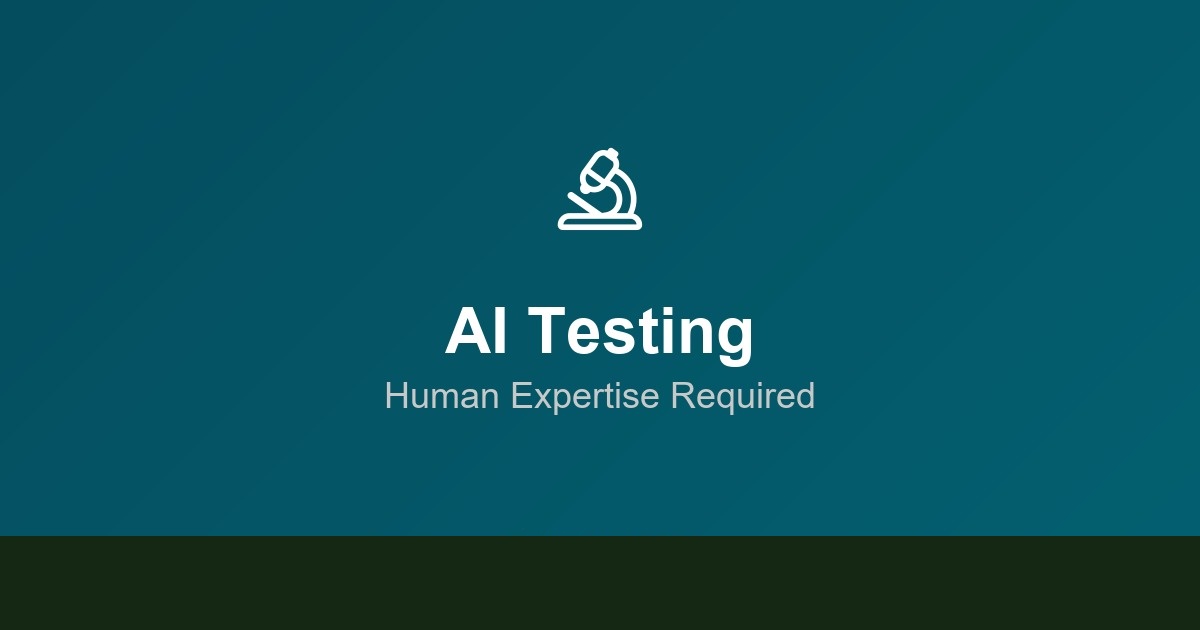AI Testing Adoption Doubles: Human Expertise Remains Paramount for Enterprise Success

**Headline:** AI testing adoption doubles — but humans still critical, report warns
Headline: AI testing adoption doubles — but humans still critical, report warnsThe rapid acceleration of Artificial Intelligence (AI) integration across enterprise operations has led to a significant surge in AI testing adoption, with recent reports indicating a doubling of its prevalence. While this growth underscores a proactive approach to managing AI risks and ensuring quality, a critical caveat emerges: human oversight and expertise remain indispensable for realizing the full potential and mitigating the inherent complexities of AI systems.
The Doubling Down on AI Testing: A Strategic Imperative
The increased adoption of AI testing is a clear indicator that enterprise businesses are recognizing the profound impact AI can have on their bottom line and operational efficiency. From automating routine tasks to powering advanced analytics and predictive models, AI promises substantial ROI. However, without robust testing, these benefits can quickly turn into liabilities. Inaccurate models, biased algorithms, or system failures can lead to significant financial losses, reputational damage, and regulatory non-compliance. Therefore, investing in AI testing frameworks is not merely a technical exercise but a strategic imperative for safeguarding investments and ensuring sustainable growth.

Beyond Automation: Where Human Acumen Shines
While automated tools are crucial for scaling AI testing efforts, the report highlights that human involvement is far from becoming obsolete. Here’s why human expertise remains critical, particularly for enterprise decision-makers:
1. Contextual Understanding and Business Logic: AI models operate within specific business contexts. Humans possess the nuanced understanding of market dynamics, regulatory landscapes, and strategic objectives that automated tests often lack. This allows for the design of more relevant test cases, interpretation of results through a business lens, and validation of AI outputs against real-world scenarios. 2. Ethical AI and Bias Detection: Identifying and mitigating algorithmic bias is a complex challenge that requires human judgment. Automated tools can flag statistical anomalies, but humans are essential for understanding the societal implications of these biases, defining ethical boundaries, and developing strategies to ensure fairness and equity in AI applications. 3. Explainability and Interpretability: For AI systems to be trusted and adopted by stakeholders, their decisions must be explainable. Human testers and domain experts play a vital role in validating the interpretability of AI models, ensuring that their logic aligns with human reasoning and can be clearly communicated to non-technical audiences. 4. Adaptability and Edge Cases: The real world is dynamic and unpredictable. Humans are uniquely equipped to anticipate and test for unforeseen edge cases, novel attack vectors, and evolving user behaviors that automated tests, trained on historical data, might miss. This adaptability is crucial for maintaining the resilience and robustness of AI systems over time. 5. Strategic Test Planning and Oversight: The design of comprehensive AI testing strategies, including defining success metrics, prioritizing risks, and allocating resources, requires strategic thinking and leadership. Human decision-makers are indispensable in setting the vision and ensuring that testing efforts are aligned with overall business goals.
Maximizing ROI: A Hybrid Approach to AI Testing
For enterprises looking to maximize the ROI of their AI initiatives, the message is clear: a hybrid approach that synergizes advanced AI testing tools with invaluable human expertise is the most effective path forward. This involves:
- Investing in skilled talent: Developing or acquiring teams with expertise in AI ethics, machine learning operations (MLOps), and domain-specific knowledge.
- Establishing clear governance: Implementing robust frameworks for AI development, deployment, and continuous monitoring that integrate human review at critical junctures.
- Fostering collaboration: Creating environments where data scientists, engineers, business analysts, and ethical AI specialists can collaborate effectively on testing and validation.

Conclusion
The doubling of AI testing adoption is a positive development, signaling a growing maturity in how enterprises approach AI. However, the accompanying warning—that human criticality remains—serves as a powerful reminder. While AI can automate and accelerate many aspects of testing, the strategic insight, ethical judgment, and contextual understanding provided by humans are irreplaceable. By embracing a balanced strategy that leverages both technological advancements and human ingenuity, businesses can confidently navigate the complexities of AI, unlock its full potential, and drive measurable success in the AI-driven era.
References
- Industry research and analysis from leading AI technology providers and research institutions.
- Enterprise AI implementation case studies and ROI analysis from Fortune 500 companies.
- Market research reports from Gartner, McKinsey, and other leading consulting firms on AI adoption trends.
- Technical documentation and whitepapers from AI platform vendors and service providers.
- Regulatory compliance frameworks and guidelines for AI implementation in enterprise environments.
Ready to Implement AI in Your Enterprise?
Our team of AI experts can help you navigate the complex landscape of AI infrastructure and implementation. Book a free consultation to discuss your specific needs.
Book Free Consultation